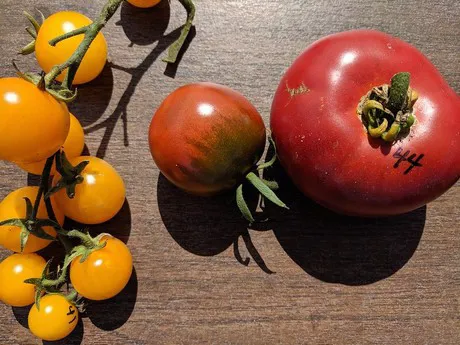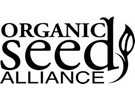Purdue University, University of Wisconsin-Madison, North Carolina State University, North Carolina A&T University, Oregon State University, and Organic Seed Alliance (OSA) are pleased to be among the recipients of the U.S. Department of Agriculture’s (USDA) National Institute of Food and Agriculture (NIFA) awards announced last month. The grant was awarded through NIFA’s Organic Research and Extension Initiative (OREI).
The project, titled Tomato Organic Management and Improvement Project (TOMI): Part II, allows researchers to build on a previous OREI grant awarded in 2014. Through the first award, researchers were successful in advancing germplasm of new disease-resistant tomatoes and identifying microbial inoculants (i.e., biopesticides) that can reduce foliar diseases on organic farms.
“TOMI has also helped our research team discover that tomato plants have lost their ability to host beneficial microbes that help fight diseases over the course of domestication, and our current breeding practices could be making this worse,” says Lori Hoagland, a soil microbial ecologist at Purdue University and lead researcher on the project. “We also determined that biological control products vary in their potential to control diseases among regions and farms, which currently prevents organic farmers from being able to rely on these products.”
This new grant through OREI will help researchers continue to address these challenges while further supporting the development of a holistic, systems-based approach to managing diseases on organic farms. This will include furthering new disease-resistant tomato varieties that have been adapted to organic farming systems and exhibit eating qualities that consumers desire.
“Tomatoes are a popular organic crop, especially in local fresh markets,” says Micaela Colley, program director for OSA. “This project will result in varieties that provide superior flavor and nutritional qualities with the production traits farmers need, especially resistance to diseases that can cripple tomato production in areas with intense disease pressure.”
“Tomato growers will be involved in all aspects of the project and gain practical hands-on experience with soil health, disease management, and participatory breeding,” Colley adds.
Participatory plant breeding combines the practical experience of farmers with the technical expertise of formal plant breeders, resulting in more high-quality organic seed and more farmers with skills to improve their own varieties.

“By combining traditional plant breeding techniques with research aimed at identifying factors that control the composition and activity of soil and plant microbiomes, the research team hopes to develop new varieties that are better able to support beneficial microbes that help tomato plants fight diseases,” Hoagland explains. “We will do this by determining how local environments and soil management practices on organic farms alter populations of soil microbes with biocontrol activity. Then, we will determine how breeding varieties in these distinct environments affects the potential for tomato plants to support these microbes and control diseases.”
Researchers will also collaborate with farmers to improve the health and disease suppressive activity of soils on their farms, and determine why inoculants work in one place and not another. This data will help inform organic farming decisions and make disease management strategies more dependable.
The overarching goals of TOMI II include:
- Helping organic farmers control diseases while promoting soil and environmental health, and delivering tomatoes with great flavor to local consumers;
- Identifying existing, and breeding new, varieties that perform well under organic conditions and ensuring farmers have access to both the performance data as well as improved varieties;
- Collaborating with organic farmers to improve the health and disease suppressive activity of their soil, and identifying biopesticides that further support disease control in areas with intense disease pressure;
- Advancing an interdisciplinary research and outreach approach (soil microbiology, pathology, and breeding) to tackle the challenge of managing diseases on organic vegetable farms by researching plant-soil-microbial interactions; and
- Furthering the science and practice of on-farm research and participatory plant breeding methods to manage diseases, which require a close collaboration between farmers, plant breeders, pathologists, and soil scientists to ensure project outcomes are relevant and useful.
TOMI II is an example of collaborative research in the public sector that is responding to the needs of organic farmers both regionally and nationally. Multiple partners leverage each other’s expertise in addition to the environmental conditions and climates in their respective regions.
For example, some of TOMI’s breeding trials are conducted in North Carolina where disease pressure is generally high. Farmers in other regions then benefit from these selections after other breeders involved in the project take that improved germplasm and further adapt it to very different climates, such as those in the Pacific Northwest.
In this way, TOMI is working toward releasing varieties that are better adapted to changing climates, resource availability, and environmental conditions to help mitigate these risks for farmers and the food supplies they serve. Adaptation is key to achieving resilience in our food and agricultural system. This resiliency is longer lasting when more organic farmers have the skills to further adapt and improve plant genetics through seed saving and on-farm breeding, and improve the disease suppressive activity of their soils. This is why TOMI also emphasizes farmer education as a project goal.
“We can’t overstate the importance of this second round of funding for the TOMI project,” says Colley. “Programs like OREI are essential to the success of organic research and delivering improved varieties to organic growers since public cultivar development takes time and generally lacks long-term funding.”
Consecutive funding for plant breeding is critical to getting finished varieties into the hands of farmers, since it takes several years to breed new varieties. It is also critical for the development of holistic, systems-based approaches to tackling important challenges like disease management on organic farms.
For more information: Organic Seed Alliance
Organic Seed Alliance
[email protected]
seedalliance.org
